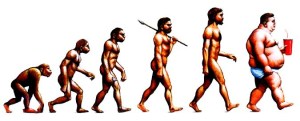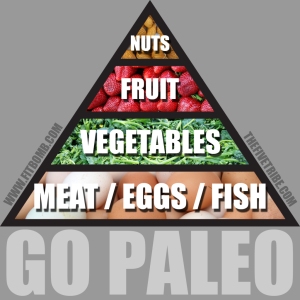Whether it’s the holier than thou douchebaggery that goes with the Paleo diet, or the fact that the life expectancy of the Paleolithic people was 35 years for men and 30 years for women, the Paleo diet does not sit well with me. So does the Paleo diet really work? Or have the cavemen pulled off one of the greatest marketing campaigns in history?
Background
Before I answer that, let me give you basic outline of the Paleo diet – just in case you’ve been living under a rock (zing)! The diet is high in protein from meats and nuts, high in fibre from sources other than grains and limits carbohydrates by focusing on non-starchy vegetables. Dairy, grains, processed oils, sugars and salts are strictly off limits with this diet. Unsure whether it’s Paleo? Well if it’s raw and overpriced, it probably is (sorry that was mean).
General health:
Having spent the last couple of paragraphs bagging Paleo, what does the science actually say? A review study found that there is weak evidence to support the Paleo diet in the prevention and treatment of various lifestyle disease and no evidence against the diet in preventing and treating such diseases (1). Looking positive so far, Paleolithics – drat! Another study, although conducted on a small number of people, found that the Paleo diet improves glucose control and blood lipid (fat) levels in diabetics, more so than a diet designed specifically for diabetics (2). Another, better quality study, found that the Paleolithic diet was more effective than a diet of equivalent calories that met Dutch Healthy Eating guidelines for reducing blood pressure, cholesterol and fat levels (3).
Well, what does this all tell us? While the science of the studies so far is by no means awesome, it looks as if the Paleo diet is at least slightly effective at maintaining general health and preventing disease. You win this round, cavepeople!
Is it healthful?
Maybe if the paleolithic people had a better healthcare system they would have lived to 1000. Sadly, the Paleo diet appears to work.
Our verdict: Moderately healthful!
I hope this has been healthful.




Reblogged this on Is it healthful?.
LikeLiked by 1 person
I have tried Paleo and I didn’t have the willpower to give up cheese (sighs)
LikeLiked by 2 people
Haha yeah, I could never give up cheese either!
LikeLike
I tried this once when I was looking for a nutrition lifestyle plan, and it was horrible. I always felt sick.. I don’t know what it was, but I definitely wouldn’t recommend it.
Good post though 🙂
xox Lo
http://www.beautybylo.com
LikeLiked by 1 person
Sorry to hear that, Lauren. Yeah, I imagine it would be hard to get used to and it may lack a few nutrients here and there that we’re used to receiving.
LikeLike
Thank you for sharing the information. I have never heard about “Paleo diet”.
It sounds interesting. More than that the illustration of evolution has strong impact!
LikeLiked by 1 person
That’s a pleasure. Yes it’s an interesting, strange trend!
LikeLiked by 1 person
I am not sure.. seems really low in fibre to me, or you would have to eat tons of vegetables to come up to the amount of fibre in beans, wholegrain etc… I am not convinced although I do think it would be an improvement for some people with really unhealthy lifestyles.
LikeLiked by 1 person
Yeah, that’s probably one of several downsides to the paleo diet. However, the paleo diet is likely vastly superior to the average western diet, which is reflected in the scientific literature to date.
Yes, it’s a fad. Yes, it’s likely not as healthy as eating a diet based on healthy eating guidelines. But if the average western person buys in to this fad, then I think it does more good than harm.
LikeLike
Here’s a new diet that would probably work just as well if not better: the don’t-eat-crap diet. Woo! But really, I have a friend that swears by the Paleo diet. Ick. I think she’s just a little OCD or maybe on the spectrum and likes the predictability of it. She brings the exact same thing for lunch EVERYDAY. Ugh.
LikeLiked by 1 person
Hahaha very, very true! Just eating healthy foods is the best option.
LikeLike
I wouldn’t give up cheese either. Not a chance. However, other than that, the Paleo diet seems good.
I could happily live on a raw diet, as I don’t eat much meat anyway. But no to giving up cheese. Big no!
I love your reluctance to agree with Paleo in this post. Amused me.
Enjoy your day 🙂
LikeLiked by 1 person
Haha thank you, cheese is the best! You enjoy your’s also 🙂
LikeLiked by 1 person
I’ve been on the Paleo diet to certain degrees off & on several times & have found that the major good thing it did for me was to get me to eat LOTS more vegetables! It also helped me get my sugar cravings under control, which was huge for me. Everyone is different & so each person has to experiment with their diet to find what works for them; I personally think I do better with less dairy in my diet, and less bread. I think the major improvement that Paleo has over the average American diet is that it avoids what Americans eat too much of – simple carbs like white bread, and JUNK FOOD. Calling it Paleo or “the caveman diet” is actually rather misleading – the Paleo diet is really about eating foods that reduce inflammation within the body. Those who are on the diet believe that grains, sugar, legumes, dairy & highly processed foods cause inflammation, and that is why they avoid them. Below is a quick synopsis from the Whole9 website about what this way of eating means:
“I eat real food – fresh, natural food like meat, vegetables and fruit. I choose foods that are nutrient-dense, with lots of naturally occurring vitamins and minerals, over foods that have more calories but less nutrition. And food quality is important – I’m careful about where my meat, seafood and eggs come from, and buy organic local produce as often as possible
This is not a “diet” – I eat as much as I need to maintain strength, energy, activity levels and a healthy body weight. I aim for well-balanced nutrition, so I eat both animals and a significant amount of plants. I’m not lacking carbohydrates – I just get them from vegetables and fruits instead of bread, cereal or pasta. And my meals are probably higher in fat than you’d imagine, but fat is a healthy source of energy when it comes from high-quality foods like avocado, coconut and grass-fed beef.
Eating like this is ideal for maintaining a healthy metabolism and reducing inflammation within the body. It’s good for body composition, energy levels, sleep quality, mental attitude and quality of life. It helps eliminate sugar cravings and reestablishes a healthy relationship with food. It also works to minimize your risk for a whole host of lifestyle diseases and conditions, like diabetes, heart attack, stroke and autoimmune.” (http://whole9life.com/2011/09/nutrition-in-60-seconds/)
LikeLiked by 4 people
Well said!
LikeLike
I have to agree with the previous post. I have been on a modified paleto diet for over a year and have dramatically increased my intake of whole vegetables and fruits, as well as grass-fed protein. In short, my food intake is comprised of what I consider to be “cleaner” foods. Granted, it is generally difficult to eat out or travel to cities that rely upon quick, processed foods. Aside from the benefits to my weight, I feel better about the food I consume.
LikeLiked by 1 person
Good one, Rena. Glad to hear it has worked for you.
LikeLike
My biggest concern with this way of eating is that it cuts out dairy and wholegrains. Big risk of deficiency in calcium, B vitamins and resistant starch by avoiding these food groups.
I haven’t seen any compelling studies around this yet – most have a very small sample number and run for a matter of weeks. So even if results are found can we be sure they are generalisable to the population or sustainable in the long run?
LikeLiked by 1 person
Good points.
Yes, those are certainly valid concerns with the diet that I should have addressed. There isn’t direct data indicating this yet, but obviously studies showing an association between decreased dairy and calcium etc.
Yes, most of the studies to date are weak. The review study – although unsystematic in nature – means we make inferences to some degree on a larger, combined sample. Long term follow up is definitely a problem.
My one argument would be that the Paleo diet is likely much healthier than the AVERAGE western diet. That the negatives of these nutrient deficiencies would be outweighed by a lower incidence of current, prevalent lifestyle diseases. Particularly considering this diet is often one turned by those trying to lose weight.
LikeLike
How do we define average!? So many variations between individuals it would be very difficult to suggest the way one group of people each is better than millions of others!
I think the main point is as long as a person is meeting their nutrient requirements and feels good, then the diet they are on it right for them, regardless of what they do/do not eat.
LikeLiked by 1 person
Absolutely!
LikeLike
This was interesting! My dad decided to go paleo for a few months and said he had never felt better, and he even lost a few pounds. We even bought him one of the gazillion paleo cookbooks so he could spice it up a bit. I think the diet even improved his cholesterol levels, like you said in your post.
Thanks for this! Very interesting blog! Love it!
LikeLiked by 1 person
Thanks, Reyesmm. Really appreciate the comment.
LikeLike
A good diet to me means one you can stick to that reduces your consumption of foods that are inflammatory, sugar-spiking, gassy, or addictive to you. It’s something you can only find individually by trial and error. Someone who finds fats addictive would probably do better on a salad-and-shake type diet. while someone with a carb habit would probably be better off on a low-carb diet. People who don’t enjoy eating could stick to calorie-counting, but people who feel deprived if they can’t have filling meals need filling foods. We’re just all snowflakes.
LikeLiked by 1 person
I would certainly agree with that, theraineyview.
LikeLiked by 1 person
I have learnt that it totally depends on the person- and maybe their blood type??
I eat cleanly and prefer raw vegetables/juices, plant based supplements and white meats. This works for me.
Bacon and heavy red meat meals do not- I cannot shift body fat when I eat it.
My ex on the other hand (I don’t know if this a crossfit/army mentality or not) really really thrived on meat heavy diet.
I guess it totally depends on what your energy requirements are, and how well your body breaks down certain foods.
I love that more people are eating clean in whichever way is best for them- this means more food choices for us!
I’d also just like to share my amusement when people tell me they’re “paleo.”
It’s kind of like finding the vegan at a party. You don’t need to ask. They’ll tell you. 🙂
LikeLiked by 1 person
Thanks for the comment. Absolutely, research in many cases fails to account for individual differences.
Hahaha they most certainly will tell you.
LikeLike